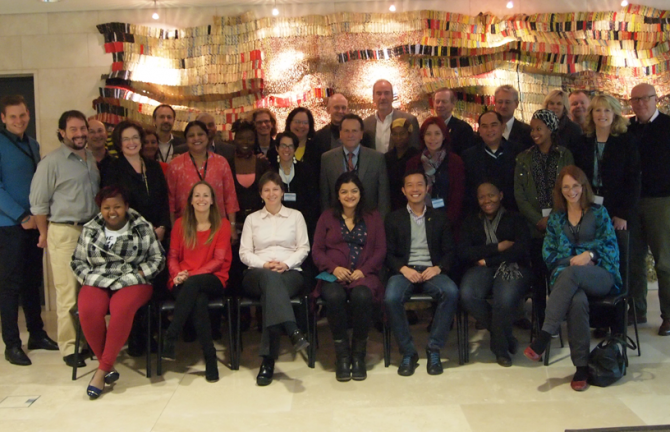

Debrief
Reviewing the role of condoms in the fourth decade of HIV
10 November 2014
10 November 2014 10 November 2014Condoms have had a transformative impact on the trajectory of HIV epidemics worldwide and today are an established, well-known and widely used prevention method. Recent findings show that condom use among young people is high and stable in many rich countries but much lower in low-income countries. Yet, global advocacy and social mobilization for condoms has become less prominent in recent years, with donor investments for male and female condoms and lubricants no longer increasing.
To keep up the momentum and accelerate condom promotion and distribution as part of efforts to reduce sexual transmission of HIV by 90% by 2020, UNAIDS, UNFPA, USAID/Office of the Global AIDS Coordinator and the Bill & Melinda Gates Foundation co-convened a meeting from 6 to 7 November in Geneva, Switzerland, to identify opportunities for condom and lubricant programming in the fourth decade of the HIV epidemic.
Participants
The meeting brought together experts from civil society organizations, government and the United Nations system.
Key messages
- In 2013, about 1.9 million new adult HIV infections occurred, the vast majority of which were due to sexual transmission of HIV.
- Condoms remain a cornerstone of effective prevention and are a core basic programme activity under the UNAIDS Investment Framework approach.
- In 2012, the donor community supplied 3 billion male and 32 million female condoms. In sub-Saharan Africa, this translates into eight condoms per man per year and one condom per every 10 women per year.
- Condom stock-outs remain a critical challenge to HIV prevention. Innovative ways to alert and overcome stock-outs are urgently needed.
- Thirty years into the response, policy barriers still limit access to condoms and lubricants for key populations, particularly sex workers, men who have sex with men and young people.
- Condoms are still often associated with promiscuity. In several countries, carrying condoms is commonly used as evidence of being a sex worker and is associated with harassment, abuse and arrest.
- Condoms are an essential part of any HIV programme and should routinely be made available in all sexual and reproductive health efforts.
- The female condom has been long neglected, but it has a critical role to play in HIV prevention as the only proven effective method designed to be used by women. It must be globally brought to scale.
Quotes
“Let us not undo our own achievements! Condom and lubricant programmes are critical to reach our HIV prevention targets by 2020. There is a new generation of young and sexually active people—they too will need condoms to protect themselves from HIV. We will not end AIDS without scaling up effective HIV prevention”
“South Africa is one of the leading pioneers of condom programming worldwide. Male and female condoms are a cornerstone of our prevention efforts—without them, we will not be able to change the trajectory of our HIV epidemic.”
“HIV prevention messages have to be strengthened to operate on a personal level to reach gay men and other men who have sex with men, especially the youngest. Condom and lubricant programming has to take into account pleasure, sexual satisfaction, relationship status and comfort with different levels of risk.”
“It is important to transcend the association of condoms with disease and rather position them as being something fun, necessary and trendy. Young people do not want to think of health but rather having a great sex life. Condoms needs to be where young people make their sexual health decisions. I am looking forward to seeing them in nightclubs, pubs, stadiums and cool student hangouts”.



